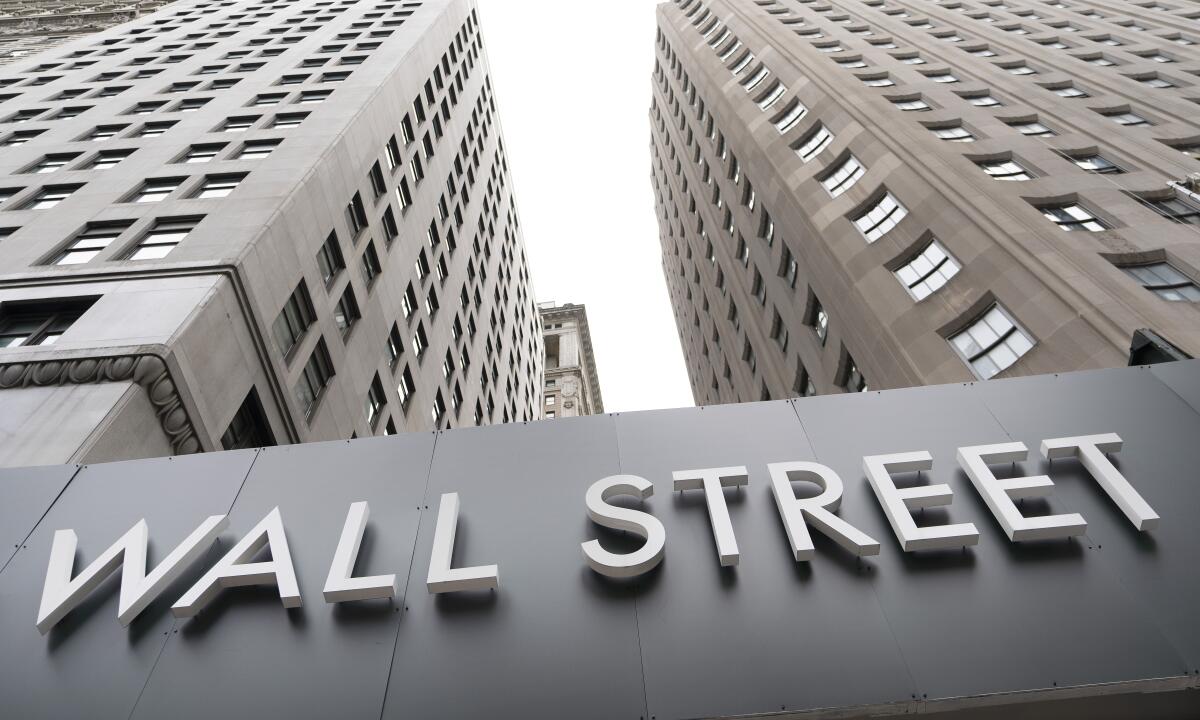Despite a mixed finish, S&P 500 and Nasdaq notch records

- Share via
Stocks closed out another wobbly day of trading on Wall Street with an uneven finish Thursday that included more all-time highs for the Standard & Poor’s 500 index and the Nasdaq composite.
The benchmark S&P 500 rose 0.4%, extending its winning streak to a sixth day. The index has notched a succession of record-high closes, often on days when the market got off to a downbeat start.
The Nasdaq climbed 0.8%, its ninth-straight gain and latest record high for the tech-heavy index. The Dow Jones industrial average slipped less than 0.1%, ending the blue-chip index’s five-day winning streak.
Clean energy activists and utility giants are duking it out over the future of rooftop solar.
More companies in the S&P 500 fell than rose, but gains by several big technology companies helped outweigh losses elsewhere in the market.
Despite the mixed outcome, the market’s latest milestones underscore how traders remain in a buying mood, encouraged by solid company earnings and by the Federal Reserve’s decision, at least for now, to only slowly begin dialing back policies aimed at spurring U.S. economic growth when it was in the throes of the pandemic recession.
On Wednesday, the Fed said it will begin reducing its $120 billion in monthly bond purchases in the coming weeks by $15 billion a month. The central bank could decide to raise its short-term interest rate, which affects many consumer and business loans, from near zero. Many market watchers concluded that the Fed was moving cautiously in tapering its support, which is good news for Wall Street.
“Ninety percent of it is ultra-loose monetary policy,” Jay Hatfield, chief executive of Infrastructure Capital Advisors, said in explaining what helped push stocks to more new highs Thursday.
“The very mechanism that’s causing inflation to rise is also causing asset prices to rise, so therein lies the dilemma,” he said. “The fact that we’re not going to have a corporate tax increase is also wildly bullish.”
The S&P 500 rose 19.49 points to 4,680.06. The index is on pace for its fifth straight weekly gain. The last time that happened was during July and August of last year.
The Dow fell 33.35 points to 36,124.23, and the Nasdaq added 128.72 points to 15,940.31.
Small company stocks also gave up some ground. The Russell 2000 index slipped 1.85 points, or 0.1%, to 2,402.43.
Investors continued to focus on the latest round of corporate earnings. Chipmaker Qualcomm jumped 12.7% after it gave investors an encouraging profit forecast and reported strong quarterly results. Other chipmakers also rallied. Nvidia rose 12% and Advanced Micro Devices rose 5.3%.
A mix of companies that rely on direct consumer spending for goods and services also made solid gains. Tesla rose 1.3%, eclipsing the all-time high it set a day earlier.
Bond yields fell. The yield on the 10-year Treasury fell to 1.52% from 1.58% late Wednesday. The lower yields weighed down banks, which rely on higher yields to charge more lucrative interest on loans. Bank of America fell 2.2%.
Solid earnings and financial forecasts helped video game maker Electronic Arts gain 2.1% and Take-Two Interactive rise 4.8%.
Moderna sank 17.9% after cutting its forecast for how many vaccine deliveries it expects to make this year. Merck rose 2.1% after British authorities approved its antiviral pill.
A key concern for investors amid the latest round of earnings has been the effect of supply chain problems on corporate profits and operations. Roku is the latest company to suffer because of those disruptions and higher costs. The video streaming company fell 7.7% after giving investors a weak sales forecast and warning that supply chain problems will probably continue into 2022.
COVID-19 led to logjams at ports and borders that continue to ripple through many parts of our economy and everyday life. When will it get better?
Inflation concerns will probably focus more investor attention toward how companies maintain their profit margins through the rest of the year, rather than measuring profit growth, said Liz Ann Sonders, chief investment strategist at Charles Schwab.
“The market is realizing that the tail wind of perpetually improving earnings is dissipating,” she said.
Investors received an encouraging update on the employment market’s recovery. The Labor Department reported Thursday that the number of Americans applying for unemployment benefits fell to another pandemic low last week, another sign the job market is healing after last year’s coronavirus recession. The agency will release its more detailed jobs report for October on Friday.
More to Read
Inside the business of entertainment
The Wide Shot brings you news, analysis and insights on everything from streaming wars to production — and what it all means for the future.
You may occasionally receive promotional content from the Los Angeles Times.












